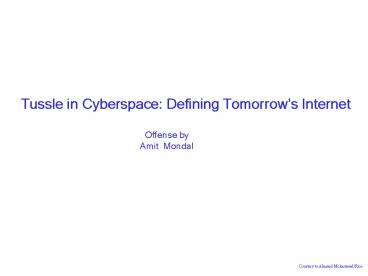Tussle in Cyberspace: Defining Tomorrows Internet - PowerPoint PPT Presentation
Title:
Tussle in Cyberspace: Defining Tomorrows Internet
Description:
Discuss ethical questions without clearly stating the ... Challenge: Lots of Choices Confuses Average User. Too much choice does not make a user happy ... – PowerPoint PPT presentation
Number of Views:97
Avg rating:3.0/5.0
Title: Tussle in Cyberspace: Defining Tomorrows Internet
1
Tussle in Cyberspace Defining Tomorrows Internet
Offense by Amit Mondal
Courtesy to Ahamed Mohammed/Rice
2
The paper basically talks about
- Accommodating choices in design
- Allows innovation
- Allows a tussle to occur
- Gives flexibility for designers and consumers
3
- It talks about more of philosophical issues
without any technical advise.
- Highlights connection between Engineering and
society, . Good, but issues discussed here not
new nor particular to the Internet.
- Lacks coherence, discuss complex issues written
in books in 10 pages, However sometimes dives
into lots of details like Source routing,
firewalls etc!
- Discuss ethical questions without clearly stating
the assumptions or value systems
- No concrete value, Things mentioned in this paper
are quite obvious but no concrete design
guidelines provided.
4
Challenge Flexibility increases complexity
- Flexible designs will be complex
- Applications should be written to deal with this
complexity
- Innovative applications come up.but slowly!
5
Challenge Designing for Outcomes
- Paper says Do not design so as to dictate the
outcome
- How can a design proceed without a goal in mind?
- Design of the internet based on packet in
packet out - functionality..very simple and not designed for
any outcome - ..packets go in and come out and this is all
happens in the - network. This simple idea was powerful in the
early days.. - but there is much fear that it seems to be
eroding.. - So what went wrong to the outcome blind
internet???? - (self-contradicting)
6
Challenge Making a tussle space does not solve a
problem
- Paper does not talk about who wins in the tussle
- Allowing a tussle to occur is not a solution
Papers Example DNS and Trademarks
- Even if we separated trademark names from
machine - names, trademarks disputes will not
disappear
one could then try to design these latter
mechanisms to try to duck the issue of
trademark
The SMTP server example A user of mail may
choose an SMTP server..An ISP might try to
control that choice by redirecting packets..
7
Challenge Lots of Choices Confuses Average User
- Installing Windows is easier than installing
Linux to an - average user
- Too much choice does not make a user happy
- Confused about choices to make and their
consequences
- Only informed persons can make correct choices
- Configuring and using simple applications
becomes hard
Papers response to this is unsatisfactory
..we may see emergence of third parties that
rate services (the online catalog of consumer
reports) and parties that provide pre-configured
software
8
Challenge Little Incentive to Providers of Choice
- Providing more choices is costly
- Popular choices will get cheaper (Economies of
scale)
- Users of less popular choices will need to pay
more
One should be prepared to pay for what one uses
or there is very little incentive for the
provider to offer it.
9
Finally, The point of this paper is known already
and acted upon
- Transport layer provides choice TCP/UDP
- IP-lock in is addressed by DHCP and NATs
- Loose source routing is addressed by overlay
routing































